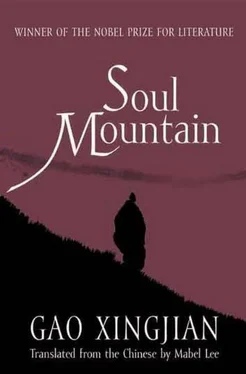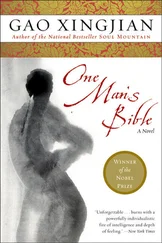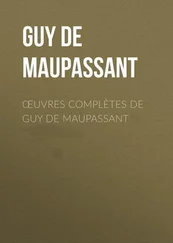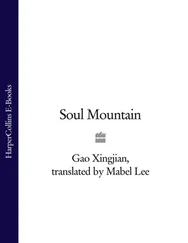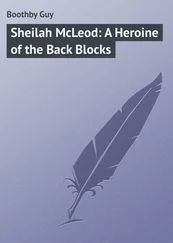Outside someone’s house, I also see a wormholed piece of leopard skin bedding airing in the sun. Tigers have been extinct for more than ten years. I also see a stuffed golden monkey. I guess it’s the one they caught in the tree, the one which refused food and died. When animals are captured and refuse to be domesticated, this is all they can do. But this requires considerable resolve, and not all humans can do this.
It is also in front of the administrative office of the reserve that I see a large sign newly posted on the wall: “Congratulations on the establisment of the Old People’s Sports Committee!” I think that a new political campaign is to be launched and hasten to ask the cadre who has put up the sign. He says a telephone instruction came from higher up — they wanted it up so he put it up. It’s got nothing to do with you or me, it’s only for revolutionary cadres who are over sixty and who are receiving at least a hundred- yuan sports subsidy. The oldest cadre here is only fifty-five and just old enough to receive the consolation prize of a commemorative booklet. Later on I meet a young reporter who says the chairman of the Old People’s Sports Committee is the retired former district party secretary, and had insisted on the reserve contributing a hundred yuan towards celebrating the establishment of the committee. The reporter says he is writing an internal reference document which he wants to go direct to the Central Discipline Investigation Committee and asks if I have any connections. I sympathize with his righteous indignation but suggest that posting it would be much more reliable than giving it to me.
I see a pretty young woman with a light sprinkling of freckles on her nose. She is dressed differently from the people on this mountain and is wearing an open-neck short-sleeved cotton-knit top. When I ask, it turns out that she comes from Zigui, on the south bank of the Yangtze, the birthplace of Qu Yuan. She has finished middle school and has come here to look for her maternal cousin and to see if she can find work on the reserve. She says the county government in Zigui has announced that the construction work of the big dam on the Three Gorges is about to start and that the county will be totally inundated. All households have filled in population evacuation registration cards and residents have been mobilized to make plans for their own livelihood. Afterwards, I travel south along the Xiang Stream which produces beautiful women, and before arriving in Yichang pass the home of the famous beauty of ancient time, Wang Zhaojun, with its black tiles and flying eaves on the mountain slope. An amateur writer tells me that the city is set to become the provincial capital of the future Three Gorges Province and that even the chair-elect of the future Writers’ Association has been internally decided. To my surprise the chair-elect is an award-winning poet of whom I’ve heard but who I can’t say I like.
I lost my poetic sensibility a long time ago and can’t write poetry. In any event I doubt that the present is an age for poetry. It seems that everything to be sung or shouted has already been sung or shouted. What remains is simply typeset, printed, and called impressions. If this is the case, then the artist’s drawings I have seen of the Wild Man with gangling arms, stooped back, thick legs and long hair, who giggles at people, and are based on scientifically-assessed eyewitness accounts appearing in Wild Man Research Association publications, are also impressions. Can, therefore, the strange sight I saw on my last night at Wooden Fish Flat in this primitive forest called Shennongjia also count as a poem?
A bright moon is in the sky. On the square in the shadow of the towering mountain, two high bamboo poles have been put up and kerosene lamps hung on them: a stage curtain stretches across the bottom section. An acrobatic troupe starts the show on the square to the sound of a battered, slightly out of tune trumpet and the muffled beat of a moisture-affected big drum. About two hundred people have turned up — grown-ups and children from the homes of this small village, including the cadres and workers of the reserve administrative office and their families and the pretty freckle-faced young woman wearing an open-neck, short-sleeved cotton-knit top who comes from the birthplace of Qu Yuan. There are three rows, packed tightly into a large semi-circle. Those in the front row are sitting on wooden stools brought from home, those in the middle row are standing, and those who come last are poking their heads in between the heads of the people in the middle row.
The program is the usual thing — qigong brick-chopping, one brick, two bricks, three bricks halved with a single chop of the hand; pulling in the belt and swallowing iron pellets and then spewing them up in a spray of spittle; a fat woman climbing up a bamboo pole and hanging upside down from a golden hook; and flame throwing. It’s all fake, it’s all fake. At first the women say this quietly then the young men start yelling it. The bald leader of the troupe shouts out, “All right, now for the real stuff!”
He hands a javelin to the iron pellet swallower and gets him to push the metal tip at his chest and throat until the bamboo javelin curves like a bow and the blue veins stand out on his bald head. People start to clap and it appears the audience has been won over.
The tension on the square relaxes, the trumpet reverberates through the shadows of the mountain, the drum ceases to be muffled, and everyone is in good spirits. The bright moon moves into the shadows of the clouds and the kerosene lamps become brighter. The sturdy fat woman balances a bowl of water on her head as she spins porcelain plates on bamboo sticks. At the end of the act she wriggles her rotund hips in imitation of the singers and dancers on TV as she skips and prances around to thank the audience. A few people clap. The troupe leader is glib of tongue and starts saying more and more audacious things as the skill content of the acts decreases, but everyone is in a good mood and is happy with whatever is put on.
The last item is a contortionist act. The girl dressed in red silk trousers and top, who up to this point has been picking up props, now leaps onto a square table. Two wooden benches are put onto the table, then another table put onto the benches. Her figure stands silhouetted high up against the black shape of the mountain, a brilliant red in the bright glow of the lamps, and instantly the full moon in the sky darkens and turns an orange-yellow.
First she does The Golden Pheasant Standing Alone, gently clasping her legs and lifting them right over her head. The audience loudly applauds. Then she does front-on splits, sitting perfectly still, flush on the bench. The audience cheers. Next with legs apart she bends backwards until the mound under her belly protrudes between her thin legs. The audience holds its breath. Her head slowly emerges between her legs and then, even more strangely, she puts her legs tightly together to hold in pincers this young girl’s head with long plaits. Her big black eyes look sad, as if they are staring at an alien world. Then her hands clutch this child-like face, and she is like a grotesque humanoid spider scrutinizing the audience. Some go to clap but stop. She props up her body on her hands then raises her hanging legs and proceeds to spin on one hand, her nipples showing clearly through her red silk top. The breathing of the audience is audible and the smell of hair and sweat permeates the air. A child wants to say something but the woman holding it silences it with a quiet slap. The girl in red, her teeth clenched, her abdomen gently heaving and her face shining with a rich glow in the clear pure moonlight with the black shape of the mountain behind, is contorted beyond human semblance. Only her thin lips and black eyes reveal her pain and it is this pain which inflames the human lust for cruelty.
Читать дальше
Конец ознакомительного отрывка
Купить книгу
